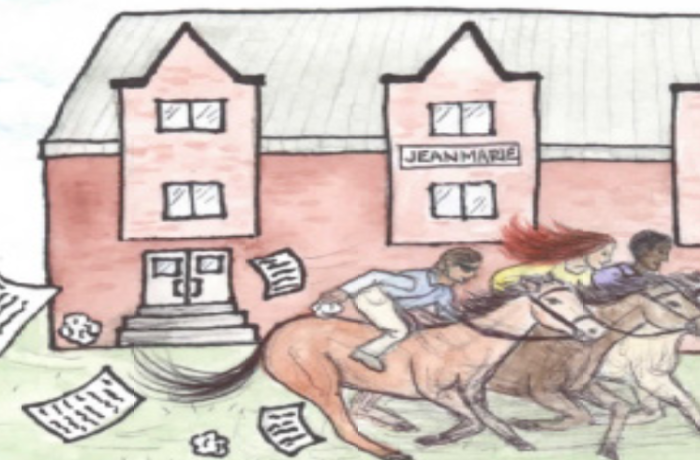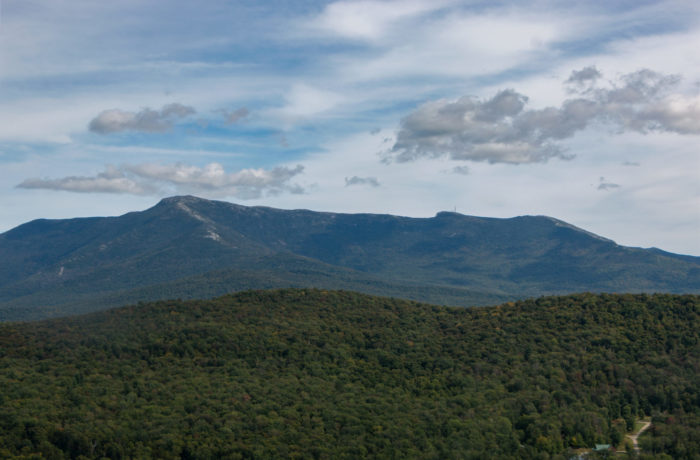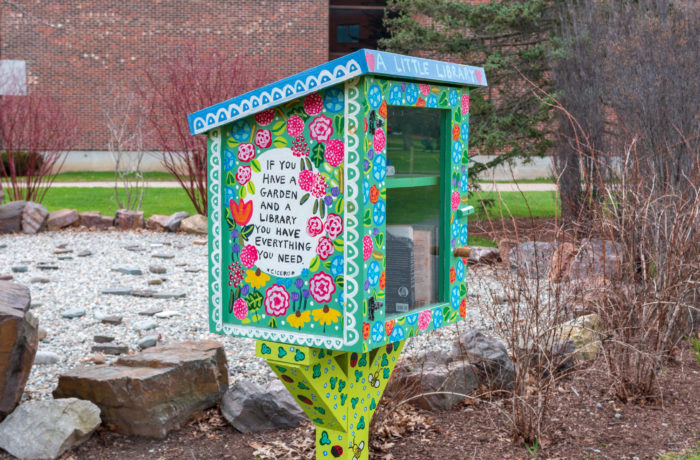By Elisbeth O’Donnell
Towering at 6’ 3” with tattoos that creep from his fingertips up into his sleeves, Arno Michaelis has a formidable presence. But as he helped move pianos to the margins of the stage in the McCarthy Arts Center, before his talk “My Life After Hate,” on September 7, he seemed more an ex-band member than ex-neo-Nazi.
Michaelis has a thundering laugh, swears in an easygoing, friendly way, and refers to friends as “buddies.”
It wasn’t until Michaelis played a video clip from his former skinhead punk band that his past as an alcoholic white supremacist was believable. His tattoos are remakes and remnants of swastikas and upside down crosses. Although most of his time is occupied by Serve2Unite, an organization he co-founded to inspire young people to be peacemakers through service and art, in the late 1980s Michaelis co-founded what went on to be the largest skinhead gang in the world, terrorizing people of color and anyone identifying as LGBTQ.
McCarthy was packed to the brim, with students sitting in the aisles and along the back of the theater while Michaelis spoke of his journey through violence, alcoholism, racism, fatherhood, and forgiveness and activism. His book, “My Life After Hate,” was published after he began therapeutically writing about his experiences in 2007. In an interview before the presentation, Michaelis revealed more about the roots of his past and his hindsight reflections.
Q: Your family struggled with alcoholism. What was it like to grow up in your home?
A: Honestly it was pretty idyllic. There are literally billions of kids on the face of the earth that would’ve happily traded childhoods with me. My dad drank a lot, but he wasn’t really a mean drunk. But it put a lot of pressure on my mom. She had to work two jobs sometimes. She was always fighting with him because he was drinking and she was miserable, and that was really my point of suffering as a kid. I was never beaten, I never went hungry, I had things pretty good. My dad for all his struggles is a good guy. He really loved me and my brother and my mum, he just has a disease.
Q: Did your parents have anything to do with your later thoughts about race?
A: Not really. My dad was pretty conservative, he still is. My mom was very, very liberal, and still is. I don’t know that we ever talked about race. My dad might have had shades of a supremacy of western civilization mode of thinking, but I don’t think that he inherently thinks that he’s superior to anybody else. In fact, I was so contrarian that had my parents been racist, it would’ve driven me to be anti-racist. I just wanted to be the opposite of whatever I thought the status quo was.
Q: What do you think led you to being a skinhead?
A: I’ve been an adrenaline junkie since day one. I became a bully very early on—my first victim was my younger brother. I terrorized him. I would pin him down with a squirt bottle of yellow mustard and squirt it up his nostrils until it came out his mouth. And he would retaliate by chasing me around with a butcher knife. I just got a big rush from it.
My parents always gave me nothing but positive affirmation, to the point where I was really sick of it. I think because everybody told me how wonderful I was, constantly, even when I was suffering, I wanted to prove to them how in fact I’m horrible, and if you don’t believe me, watch what I’m going to do to this kid. Watch what I’m going to do to the principal. I defined my self worth through violence. I was like: I hate you, I hate society, I hate the cops, I hate the government, I hate the school, and it’s not much of stretch to then say I hate Jews, I hate blacks. I felt the ability to instill fear into people a rush into itself. But like any kind of substance abuse, 10 times later is not as thrilling, so you have to keep escalating.
Q: Did you find the skinhead movement or did it find you?
A: I found it through white power skinhead music; it seethed with all these themes like race and nation and blood and soil, the same kind of imagery that the Third Reich revolved around, telling young men that this was their purpose. And it pissed people off–that’s why I got into it.
Q: When did you realize that what your were doing was wrong?
A: When I started writing, I looked back at my childhood in detail and it occurred to me, I was a sociopath. I was very disconnected from other people’s feelings. I didn’t hesitate to manipulate people. I used my charisma and my leadership and my popularity to hurt people, and I threw out my whole life. Everybody knew who I was. Half the people loved me, the other half hated me.
Q: What was your turning point?
A: Single parenthood followed by the murder of friends were the excuses I was looking for. I was burnt out on the movement. The gang completely cannibalized itself. We fought each other as much as we fought anybody else. An organization whose culture is hate and violence is not the most functional organization. My band had a lot to do with it too. We all had young families, we all worked shit factory jobs, we were all, like, scraping by, and it just because more and more apparent that all this energy we were putting into the movement isn’t giving us anything back.
The moment you peek outside of this ideological box and you see like, “wow, black people really aren’t all out to kill me.” You start to see that it’s a bunch of bullshit. And then you ask yourself “why am I risking my life to do this?” We switched to a regular C-level metal band. We were good enough that we knew we could make a meager living.
Q: Can you recall your first positive experience with a person you would previously hated?
A: I went from being a white power skinhead to being a raver in the span of two years. The rave scene back then was extreme peace, love, unity, respect. Everybody was accepted, including me, when I still had swastikas all over me. Going to rave parties, you see a lot gay people, you see a lot of people of every ethnicity. There was one guy in particular, this tiny, very effeminate gay black guy. When I first saw him I was freaked out. I was so conditioned to see him as something disgusting. But as I got to know him, he was super nice, super funny. He knew about my past and it didn’t change the way he saw me. That really struck me. I was really happy to be friends with him, but at the same time, that’s what began a self loathing. I was constantly trying to numb through tons of drugs and continuous alcohol. I had hurt a lot of people. It haunted me. That really didn’t work itself out until I quit drinking and started writing.
Q: Have you apologized to someone you hurt?
A: I have had to mend my relationships with all of my family. I put my mom and dad through hell. I put my little brother through hell. And the work I do today with Serve2Unite, co-founded with Pardeep Kaleka, is very much in reconciliation. Pardeep’s father was murdered by a white power skinhead that was part of the gang I helped to start.
Q: Are you still working through any form of guilt?
A: Self forgiveness will be something I deal with to the grave. What I did is always a problem. But I have to actively transform the trauma into motivation to help other people.
In 2009, I started meditating in a Tibetan Buddhist tradition. I realized that the thought of a double cheeseburger with the works was essentially the same raw material as this giant grudge against myself. Later, as I started working with young people in 2010, it really became apparent to me that so many of these young people, who were in danger of making the same mistakes I made, had done something that they felt they couldn’t forgive themselves for. If I’m beating the shit out of myself because of who I was and what I did, it diminishes my ability to help other people heal.
Q: What would you advise someone who is on the receiving end of the hatred you once promoted?
A: The most important reaction is one of compassion. That serves the target more than it does the abuser by releasing you from their hate. In my opinion, and my experience, responding to violence with violence is capitulation. Defy violence with compassion, with kindness. Obviously if someone is physically attacking you, yes, by all means, defend yourself; I am not a pacifist. You’re never gonna beat the hate out of somebody. You’re never gonna bludgeon someone to the point of changing their hearts and minds whether it’s physical bludgeoning or a verbal one or an intellectual one. Maybe a spiritual bludgeoning?
Q: It’s said that addicts are always “recovering,” never cured of being addicts. Where do you get your thrill now?
A: Travel is my favorite thrill nowadays. I still like to hit things and would like mui thai or jui jit su but I’m too fragile from all the stupid things I used to do. I still like to piss people off. There are still certainly situations where people need to be pissed off and challenged. Now I just try to be a little more mindful about choosing the right time and place and the right subject. I think when we’re talking about race, and we’re talking about privilege and oppression, people have to be jarred out their comfort zone, so I’m happy to do that.


